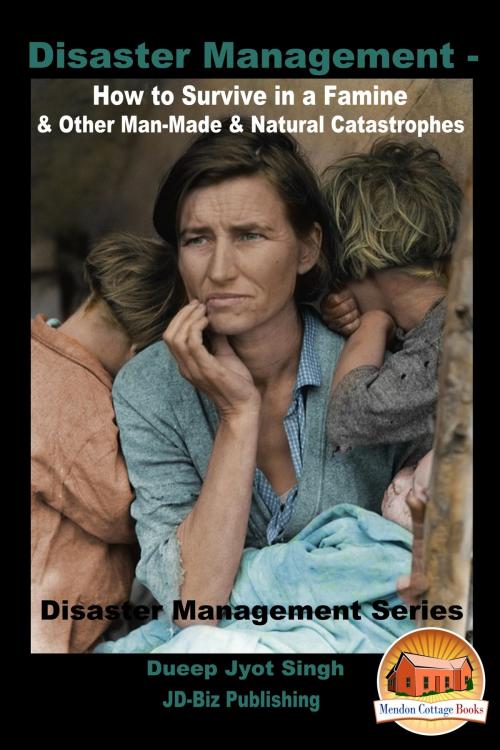Disaster Management: How to Survive in a Famine & Other Man-Made & Natural Catastrophes
Nonfiction, Science & Nature, Technology, Engineering| Author: | Dueep Jyot Singh | ISBN: | 9781370741007 |
| Publisher: | Mendon Cottage Books | Publication: | February 19, 2017 |
| Imprint: | Smashwords Edition | Language: | English |
| Author: | Dueep Jyot Singh |
| ISBN: | 9781370741007 |
| Publisher: | Mendon Cottage Books |
| Publication: | February 19, 2017 |
| Imprint: | Smashwords Edition |
| Language: | English |
Table of Contents
Introduction
Survival of the Fittest
The Right to Bear Arms…
First Priority – Water
Water Filtration Methods
Storing or Hoarding Food
Your Neighborhood Security Watch Group
Leadership for Survival – Possible Factors for Potential Catastrophe
Survival Outside – Trapping, Hunting, and Fishing
Extra Emergency Items in Your Kit
Making a crochet hook –
Conclusion
Author Bio
Publisher
Introduction
Canning and preserving your own food means that you are going to have an adequate stock of food, in case of famine. Also, nobody can accuse you of hoarding food, in an emergency, which according to them should be distributed to everybody else who did not do any canning or preserving!
This book is not for the faint hearted. It is not like other books on survival, with just a number of tips and techniques, because it has real life situations and episodes, based on experience and circumstances. These include war, riots, genocides, and other man-made catastrophes, which the author has experienced, during her lifetime or which has been recounted to her by her family members during their lifetimes.
Unfortunately, all over the world, there is absolutely no generation which can say that it has not faced war, catastrophes, or other natural and man-made disasters. That is why even though this book may have a number of episodes, which may look really horrible, especially to people who have never faced any drastic catastrophe, but one has to face reality and be ready for the worst.
You may also say, that these things happen in your continent or country, it cannot happen in my country, because we are civilized, have a strong law and order system, and so on. But remember that during catastrophes, nothing is normal, and that is when human beings and their true natures come to the forefront, and a survival of the fittest, and a fight to live, and the need to preserve and protect. This is the first natural instinct of human beings, and it cannot disappear through a thin polish of civilization.
One sunny evening I asked a number of my friends during a casual weekend get-together, in America, whether they knew anything about surviving in famine conditions or any other disaster conditions. Their immediate response was that this was not possible in America, due to its state-of-the-art disaster management technology, and latest knowledge on how to deal with disasters in any form.
Also, according to them, thanks to the large amounts of food being produced, by their farmers, there was absolutely no chance of famines or droughts, and the only disaster against which they could survive was natural catastrophes.
This was 20 years ago, and I could say, that at that time, the outlook was rather positive, for mankind to survive for another couple of millenniums. Unfortunately, with the coming of more natural disasters every year and even man-made catastrophes like war, the chances of one suffering from a famine is getting to be larger, every year.
I am not a pessimistic soothsayer. I am just being practical. Look around you. Remember the social, political, economical, and financial condition of the world around you, of say 25 years ago, and compare it with the same factors today.
You are going to be surprised at the number of catastrophic disasters, wars, political upheavals, and other factors which are detrimental to the human condition, and its steady rise, every year. So there is absolutely no basis for you putting your head under your safety blanket, and curling up in a corner and singing, no, no, this cannot happen to us, because we are invulnerable, invincible, survivors, and the government is going to protect us.
Table of Contents
Introduction
Survival of the Fittest
The Right to Bear Arms…
First Priority – Water
Water Filtration Methods
Storing or Hoarding Food
Your Neighborhood Security Watch Group
Leadership for Survival – Possible Factors for Potential Catastrophe
Survival Outside – Trapping, Hunting, and Fishing
Extra Emergency Items in Your Kit
Making a crochet hook –
Conclusion
Author Bio
Publisher
Introduction
Canning and preserving your own food means that you are going to have an adequate stock of food, in case of famine. Also, nobody can accuse you of hoarding food, in an emergency, which according to them should be distributed to everybody else who did not do any canning or preserving!
This book is not for the faint hearted. It is not like other books on survival, with just a number of tips and techniques, because it has real life situations and episodes, based on experience and circumstances. These include war, riots, genocides, and other man-made catastrophes, which the author has experienced, during her lifetime or which has been recounted to her by her family members during their lifetimes.
Unfortunately, all over the world, there is absolutely no generation which can say that it has not faced war, catastrophes, or other natural and man-made disasters. That is why even though this book may have a number of episodes, which may look really horrible, especially to people who have never faced any drastic catastrophe, but one has to face reality and be ready for the worst.
You may also say, that these things happen in your continent or country, it cannot happen in my country, because we are civilized, have a strong law and order system, and so on. But remember that during catastrophes, nothing is normal, and that is when human beings and their true natures come to the forefront, and a survival of the fittest, and a fight to live, and the need to preserve and protect. This is the first natural instinct of human beings, and it cannot disappear through a thin polish of civilization.
One sunny evening I asked a number of my friends during a casual weekend get-together, in America, whether they knew anything about surviving in famine conditions or any other disaster conditions. Their immediate response was that this was not possible in America, due to its state-of-the-art disaster management technology, and latest knowledge on how to deal with disasters in any form.
Also, according to them, thanks to the large amounts of food being produced, by their farmers, there was absolutely no chance of famines or droughts, and the only disaster against which they could survive was natural catastrophes.
This was 20 years ago, and I could say, that at that time, the outlook was rather positive, for mankind to survive for another couple of millenniums. Unfortunately, with the coming of more natural disasters every year and even man-made catastrophes like war, the chances of one suffering from a famine is getting to be larger, every year.
I am not a pessimistic soothsayer. I am just being practical. Look around you. Remember the social, political, economical, and financial condition of the world around you, of say 25 years ago, and compare it with the same factors today.
You are going to be surprised at the number of catastrophic disasters, wars, political upheavals, and other factors which are detrimental to the human condition, and its steady rise, every year. So there is absolutely no basis for you putting your head under your safety blanket, and curling up in a corner and singing, no, no, this cannot happen to us, because we are invulnerable, invincible, survivors, and the government is going to protect us.















